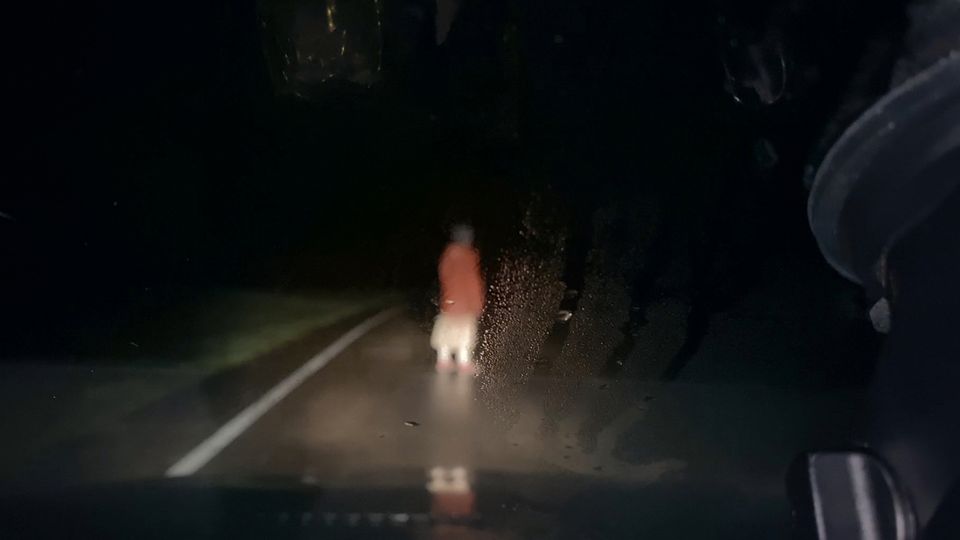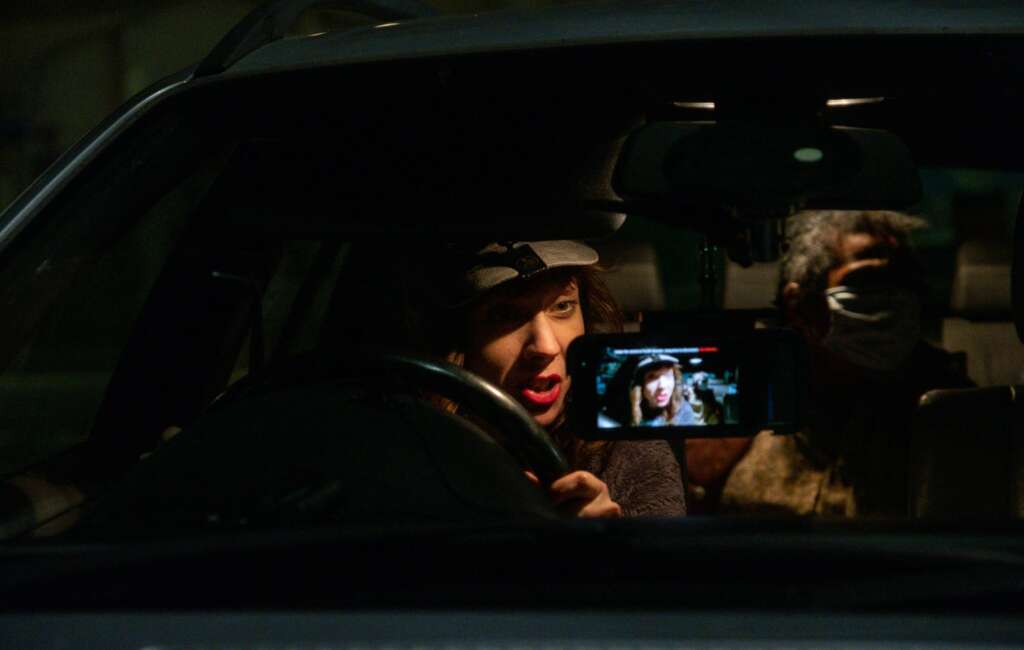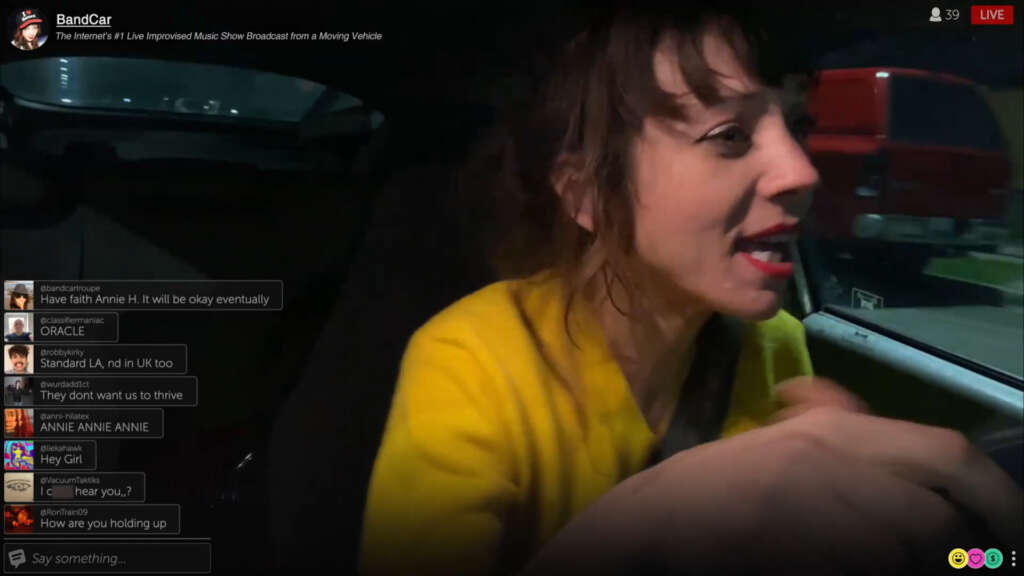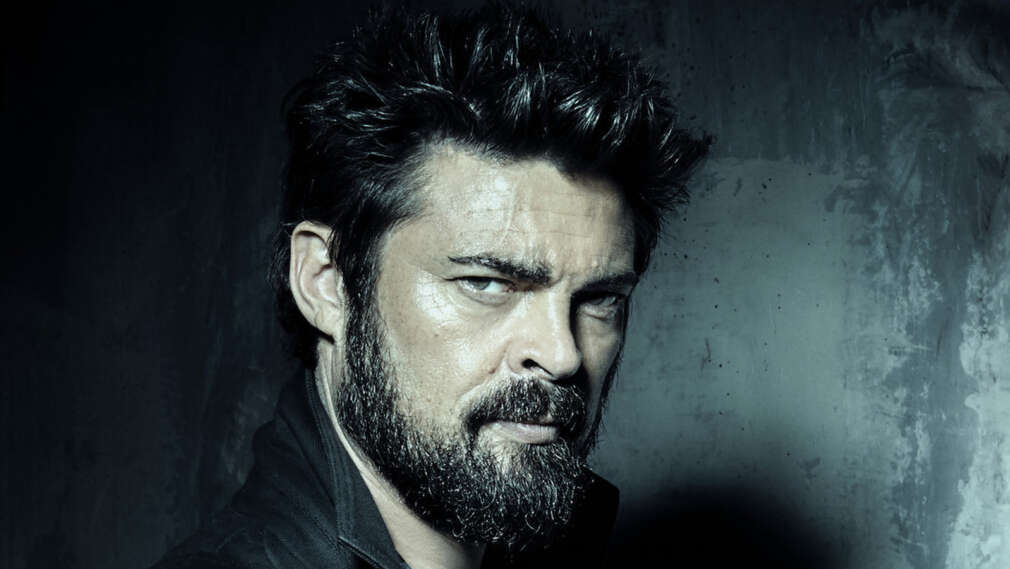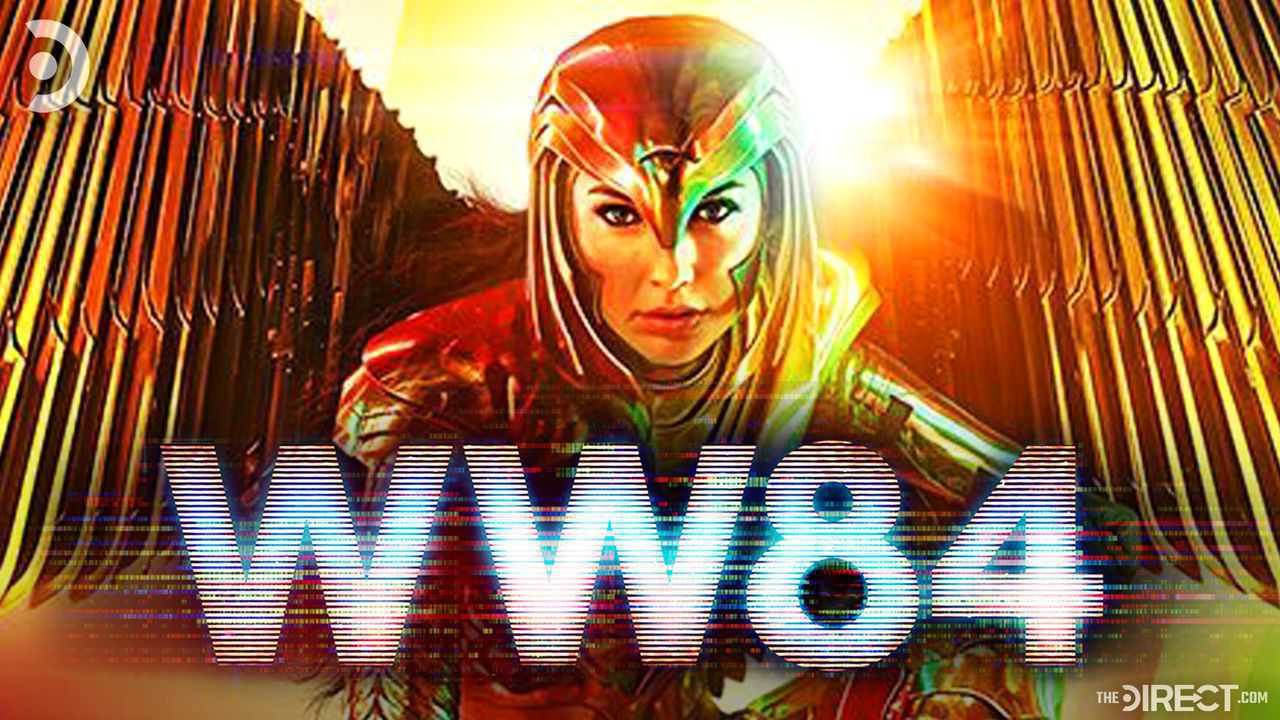Director Rob Savage is back following hit lockdown Zoom flick Host with splatter movie Dashcam – which is one of this year’s most gleefully bonkers thrill rides yet!
The film follows Annie, a foul-mouthed rapper who sports a MAGA hat. Frustrated by her pandemic lifestyle in California, Annie escapes to the UK to visit her old bandmate Stretch (Amar Chadha-Patel), livestreaming the whole way. She causes chaos when tagging along on his food delivery job, but soon finds herself in danger after she agrees to help transport a frail elderly woman out of town (Angela Enahoro.)
We recently had the chance to sit down with the director to chat about shooting the film entirely on an iPhone, working with Blumhouse and the found footage genre – along with briefly touching on his upcoming Stephen King adaptation The Boogeyman.
Hello! Thanks for taking the time to talk to us. How are you doing today?
RS: I’m good. I’m tired – I’m currently in the editing room (for the Boogeyman). But yeah, it’s going good.
Good, good. So I absolutely loved the film, watched it the other day. So, just after you discovered you had Blumhouse backing and budget, what were your like instant thoughts on what you wanted to do differently in Dashcam than Host?
RS: Well, I wanted to do something totally different from Host, because I thought to try and repeat that film would be a mistake – trying to do something in that same mode as Host. But at the same time, I wanted to kind of continue working with the same team, working in a similar way that we worked on Host. But to be honest, it was like I wanted to make a movie that that got me out of the house because I’d been you know, we’d been in lock down. And it was like, what’s the total opposite of Host, where we couldn’t see each other, we couldn’t be in the same room? Let’s do a horror road movie. And let’s make it bloody and splattery and running around and all the stuff that we couldn’t do when we were housebound.
Definitely yeah. And it’s such a roller coaster of film. There’s like so many intriguing fun twists and turns and just a great time watching it. What was the process for developing the script this time around? Because I read he didn’t really have much of a script!
RS: No. It was it’s kind of an improvised movie, kind of like Host. You know, with Host we we had about five days where we kind of like brainstormed ideas. And with Host we shot off like this bullet point, like 12 pages, and pretty much the same with Dashcam. We actually made this movie in the winter of 2020. So we made it right after Host came out, we went straight to making this movie with no time at all. Because we just wanted to move onto another movie straightaway. And part of the idea with Dashcam is that we do it exactly the same as Host and we’d shoot we kind of loosely improvised. We had a rough structure. And you know, really it was the only thing that made me confident about doing it was Annie and her amazing, like gutter brain that was so fast at coming up with these profane, brilliant exchanges.
Yeah! So, what was filming like because it was shot entirely on an iPhone wasn’t it? You also have so much more action scenes as well, what with the car sequences and particularly the water scenario?
RS: It was good. It was chaotic! It was like very very different. You know on Host I was able to like sit like I am now, on a zoom and you know when I was drunk most of the time just like at home sipping a gin and tonic – I was very relaxed. Whereas this, it was like out in the cold and the elements running around with a, you know, an iPhone and a lot of it was shot by the cast. And I would be watching on a monitor that we had hooked up to the iPhone or I’d just have to review the footage after they shot it. And then for some of the more involved stuff I’d like dress up as Annie or dress up as Angela so I can run around and operate the camera myself. But the nice nice thing about shooting an iPhone is like you can, if the scene changes, if we improvise something that’s better than what my original idea for the scene – there’s not like 100 people standing around, that slows you down. If you want to suddenly decide to shoot over there, you can go and shoot over there. Because really, this film was just a handful of people you know, shooting in Wakefield, Norfolk.
So could you delve more into the technical process of bringing the more sort of supernatural effects to life? Because that was just so much fun.
RS: A lot of it was really old school, you know, we did a lot of wire and poly stuff like we did on Host. But I really wanted this to be like a splatter movie, you know, whereas Host was like, paranormal activity. I wanted this to be like, Evil Dead 2 or something. I really wanted Dan Martin – our special effects man – to just go wild. So the very start of the process, we jumped on a call and I was like, Dan, you pitch me ideas, you tell me what you what you want to do and I’ll just, you know, pay for it! And so he came up with this like laundry list of gory gags to put in the movie. And it was like, oh, they wouldn’t let me do this on Possessor (the last film he’d worked on) but I’ve always thought this would be cool, so I was like I’m taking that. And I’ll take this idea. And we just worked it into the script as we went along. And we were pretty low budget, even though we had a bit of Blumhouse money. So you mentioned that underwater scene, like we couldn’t afford to do it in a proper studio so we just built our own underwater studio in Norfolk on some farmland. We got a big shipping container and we filled it with water and we warmed it up. And then we just lowered the car with a crane into the water. So every single thing in the movie is like, slapped together in some unique way.
So Annie is somewhat of sort of controversial protagonist, I would say. Was it your intention from the get go to sort of subvert the typical leading role?
RS: I think part of what was interesting was like, horror is nihilistic, but it’s also weirdly empathetic. And I thought like, it’d be fun to have a character who everyone at this moment in time, (being the end of 2020) was demonising – who you would cross the street to avoid – but by the end, would have you rooting for them. I think that’s a testament to what horror can do or, you know, maybe we totally failed, and you wanted her to die! But either way, I think she’s like crazily entertaining as a person and as a personality. But really, it was just to prod and poke and provoke and have a bit of fun with.
Definitely. So talking about that, what are your thoughts on certain media outlets saying, this is the most polarising film in years? Like, because obviously, we had Titane have that kind of mantle previously? That was supposed to be the most striking film in years. Do you kind of like it?
RS: It’s different. I mean, to be honest, like there’s obviously a ton of people who don’t like Host, but generally, everything was right, the reception was very warm and and we knew that we wouldn’t get that with Dashcam. And I think Dashcam is roughly like a 50/50 split down the middle, which is pretty much like politically how we are these days anyways, proof really, we’re pretty much down the middle. And both think that the other side is totally monstrous. So it kind of it kind of feels appropriate that about half the people who watch this film, absolutely fucking hate it. But we’re just trying stuff out, I mean, that’s the fun thing about making these these fast and dirty like Blumhouse movies, is we can try stuff out. And if it works for some people, it works for some people, and if it doesn’t, then they don’t have to watch it again.
Yeah, I’d definitely recommend seeing it with a big audience.
RS: It’s a movie that wants you to participate. That’s how we saw it. Like making this movie was about like, let’s get out and be together and make a movie together. But let’s also make a movie that people can see together and you know, you can have a few beers and get drunk and get rowdy and yell at the screen and and laugh and throw up and you know, storm out of the cinema if you don’t like it, but you react to it, you know, they’d be there in the crowd and let them know how you feel.
Definitely. And so following Dashcam and films like Searching and Spree, where do you see the found footage genre going next?
RS: I think it’s just a bit of fun. I mean, you know, half of the time we’re on Zoom or on our phone, or we’re like, you know, we’re communicating with people in this kind of indirect way through various platforms. And so you know, it’s part of the fabric of our lives. And for me, the best horror is about taking something that’s familiar and something that feels safe, and then just like, perverting it in some way, you know, like Nightmare on Elm Street. You know, it works out well, because it takes the place, you’re meant to feel safest, which is your bed, and that makes that the battleground for this evil, demonic force. And so I think there’s something as our lives become more and more on these these social platforms – if you can lock into something that feels familiar and feels potent – then I think it’s a great and cheap way for filmmakers to come up with stuff that will really resonate.
And so what’s next, is it full steam ahead on the Stephen King adaptation – The Boogeyman?
RS: We’ve finished shooting that so I’m in the edit for that at the moment. I went straight on to that and that’s been the nicest thing about all the kind of the success of Host – that we were able to go straight into Dashcam, and then I was able to go straight on to the next movie, and I really haven’t stopped working. So I can’t really say much about it but we finished the shoot on that and so far we’re a few weeks into the edit, I’m really pleased with it and think it’s going to be really a kind of beautiful movie. And really scary, hopefully, knock on wood! So it’s that for the foreseeable.
Dashcam is in UK cinemas from 3 June 2022.

